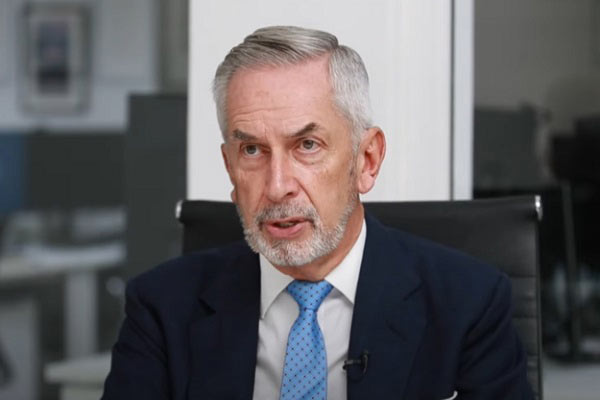Terry Smith on why Fundsmith Equity has underperformed for three years
The star manager says the strong returns from the ‘Magnificent Seven’ shares hurt his performance relative to the global benchmark.
18th March 2024 09:50
by Sam Benstead from interactive investor

Fundsmith Equity, managed by Terry Smith, has underperformed its benchmark for three calendar years in a row.
In 2023, his global equity fund returned 12.4%, which was below the 16.8% return for the MSCI World index, a measure of performance for developed world equities.
- Invest with ii: Open an ISA | ISA Investment Ideas | ISA Offers & Cashback
In 2022, Fundsmith Equity fell 13.8% and the market fell 7.8%. In 2021, Smith returned only slightly less than his benchmark, at 22.1% versus 22.9%.
So far in 2024, the £25.4 billion fund is beating its benchmark, returning 8.9% compared with 6.5% for the MSCI World index.
Speaking to investors at his annual general meeting in London, Smith blamed his recent underperformance versus the benchmark index on the very strong returns of the “Magnificent Seven” stocks, which include strong performers last year such as Nvidia, Tesla and Apple.
- Magnificent Seven: time to take profits? Here’s what the pros think
- Scottish Mortgage repurchases tech giant after value almost trebles in 2023
These shares make up a large share of the MSCI World index: Apple and Microsoft have current weightings of 4.6% and 4%, while Nvidia is 3.4%, Amazon 2.5% and Alphabet 2.4%.
Smith warned that strong returns from a select group of companies, accompanied by stock market hype around them, could be a sign of a period of pain ahead and it will therefore prove to be a wise investment move to not own all of them or believe the hype around this group of companies.
Smith does own Apple, Microsoft, Meta Platforms and Alphabet from the group, but Apple and Alphabet are relatively small positions for the fund manager. Microsoft and Meta are in his top 10 most-held shares. He says he will never own Tesla.
Smith said: “Brokers who want to get you to do things have wonderful ways of inventing names for things...the BRICS, Magnificent Seven, the FANGs.
“The Nasdaq delivered a 43.4% return last year. These seven stocks accounted for 67.8% of that return.
“If you didn't own all or most of these stocks, it was close to impossible to outperform.”
Smith looked at a version of the Magnificent Seven chosen by Goldman Sachs in April 2000 – what was then called the “Super Seven” at the time.
- Why 2023’s biggest stock market story has staying power
- Terry Smith adds tech stock owned by Smithson to flagship portfolio
The shares included Dell, Cisco and Oracle. However, five years later the average return was a 52.8% loss and over the next 10 years it was a 36.6% loss.
Smith says: “There’s a great saying ‘history doesn’t repeat itself but it rhymes’, and I think we may find that if we had on your behalf entered into a full blown ‘let’s own the Magnificent Seven last year’ then we might eventually be watching the sequel to it and with the same outcome.”
Smith focuses on buying what he calls “high-quality” companies – those that have steady profit growth and whose businesses can still be resilient in a recession. He pledges not to overpay for these firms, and then hold them for the long run.
Smith sold Amazon last year, which was a top-performing stock for the benchmark, which therefore hurt performance.
- Top tech investor on how to profit from artificial intelligence
- Why tech has another great decade ahead of it
Smith explained: “We’ve always liked the Amazon Web Service business, so we didn’t have to worry too much about that. But then the relatively new chief executive Andy Jassy made remarks about wanting to go big in grocery and online retail, which in our view is disastrously stupid I’m afraid.
“And so we sold it. We may, of course, have done a disservice by being very vocal about that. Not that I overestimate our impact on anything in life, but he hasn’t actually done it, so the thing we worried about hasn’t occurred. But we really don’t like people who start saying they’re going to do things which we think are a very bad allocation.”
Fundsmith Equity is a member of interactive investor’s Super 60 list of recommended funds. Since launch in 2010, it has returned 607% compared with 345% for the MSCI World index and 231% for the average global fund.
These articles are provided for information purposes only. Occasionally, an opinion about whether to buy or sell a specific investment may be provided by third parties. The content is not intended to be a personal recommendation to buy or sell any financial instrument or product, or to adopt any investment strategy as it is not provided based on an assessment of your investing knowledge and experience, your financial situation or your investment objectives. The value of your investments, and the income derived from them, may go down as well as up. You may not get back all the money that you invest. The investments referred to in this article may not be suitable for all investors, and if in doubt, an investor should seek advice from a qualified investment adviser.
Full performance can be found on the company or index summary page on the interactive investor website. Simply click on the company's or index name highlighted in the article.